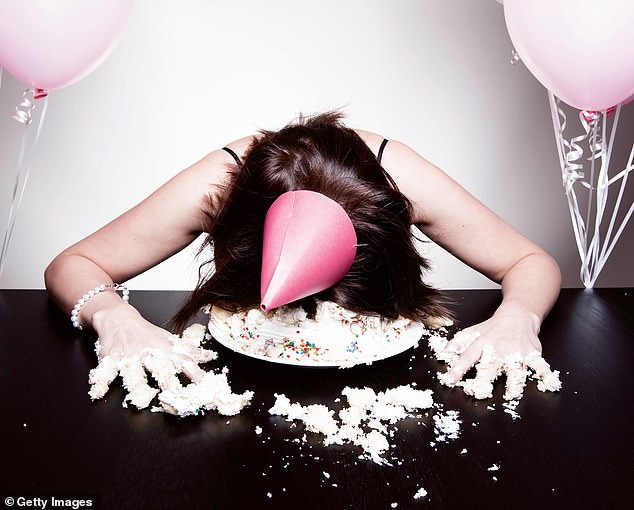The year I turned 40 in 2017, I vowed to have a party. I cannot overstate how out of character this was. Parties involve admin, tidying up, and plenty of potential for humiliation. I hate all these things. But, after five years of juggling tiny children with writing and a full-time university job, I longed for freedom and parties and fun.
My birthday is the night before Guy Fawkes so I decided to gather my friends at the top of Primrose Hill, North London, to watch the fireworks across the city. I imagined something out of a Richard Curtis film: us giddy drunk in bobble hats, our upturned faces bathed in the green and gold trails across the sky.
‘It’s November,’ my husband warned. ‘It will be cold.’ But organising a party, I figured, requires nothing if not audacity. I emailed friends, old and new. I bought paper cups and bottles of wine, and located my thermals. I sent out a reminder the week before and another the day before, agonising over the phrasing, not wanting to seem too desperate or too casual. I made brownies and wrapped them in tinfoil, and endlessly refreshed the weather app on my phone, praying it would not rain.
Waking up on the morning of the party, I found the first text waiting. ‘I’m so sorry, I’ve got the flu.’ ‘Oh poor you!’

I replied, sending kisses. So what? It was only one out of the 25 who’d said yes. But then the next text arrived, and the next. There were work deadlines and childcare glitches. Soon I was down to ten people, then eight. Could I cancel? But what could be more humiliating than ditching your own birthday party because no one was going to come?
I crossed London on trains and buses, the rucksack of wine and brownies shamefully heavy on my back. In the end five people showed up, and none were people I had known that long. I was so grateful they had made the effort – but there was no denying the awkwardness. We joked about the awfulness of friends not showing up and wondered if perhaps an outside party in November hadn’t been the best plan.
But secretly I knew: I deserved it.
The ‘flaky friend’ is a modern scourge – at least, according to magazine columnists and online blogs. In our over-scheduled, hyper-connected, burnt-out lives, it is becoming more common to cancel at the last minute, or even fail to show without warning. I like to think I was ahead of the curve. In my 20s – when playing Snake was the most exciting thing you could do on your phone – and even in my 30s I endlessly bailed on my friends. Sometimes, I confess, it was because a better offer – or a boy – had come along. Occasionally it was because I was dreading the event in question.
But mostly it was due to the general air of chaos that surrounded me in those years. I’d oversleep, only to be woken by an irritated phone call, asking whether I still planned to come to the brunch/walk/gallery trip (my fake coughing fooling no one). Or I would arrive for dinner in time for pudding, flustered and blathering about getting lost or being stuck at work. I missed theatre shows, a roller-disco trip, and I stood up friends in the pub. I was disorganised around family events and work, but friends – because we are not obliged to keep our commitments to them in quite the same way – bore the brunt.
My worst flake was failing to show at a friend’s wedding. I had RSVPed and marked it on my calendar. Yet, as the day approached, reality dawned. I had not booked a train, had found nowhere to stay and had nothing to wear. It wasn’t until the morning of the actual wedding that I finally emailed (emailed!) saying I was ill and couldn’t make it. I knew it was beyond the pale. I lay in bed, with a tub of ice cream, wondering why I couldn’t live as other people did, in a capable, organised way. What once passed for charmingly absent-minded had become downright rude. I avoided the friend in question for years after that, assuming she’d written me off. Only the illness of a mutual friend gave me the chance to show I could do better, even if both of us have politely skirted all mention of my terrible behaviour since. I was lucky.

Tiffany Watt Smith ‘My worst flake was failing to show at a friend’s wedding’
People have always warned about friends like me. In 1205, the Italian writer Boncompagno da Signa created a whole taxonomy of bad friends who betrayed, abused or otherwise disappointed, including unreliable types who failed to show up when needed.
Today, even as we complain that flakiness is on the rise, we are less moralistic about it, recognising that in a world of endless virtual social encounters, our capacity for real-world interactions is shrinking. The conversations around social anxiety and neurodiversity also show that what can seem like casual ‘flaking’ might have involved hours, even days, of agonising. But then there are the self-appointed social media ‘experts’ who frame ditching friends as noble ‘self-care’. If we are in the era of the flaky friend, it is partly due to their normalising this behaviour – a dangerous step in an age when we are more lonely than ever.
When I was researching my new book, Bad Friend, I conducted interviews with dozens of strangers about friendship and heard less easily told stories. There was the 52-year-old man who suspected his friend, who often cancelled because of work, cared less about their friendship than he did – a thought he found humiliating. Or the 40-year-old woman who described, after years of disappointment, mentally ‘downgrading’ her flaky friend: the relationship eventually fizzled out. Without legal contracts of marriage or obligations of blood ties holding them together, it’s surprisingly easy for friendships to drift away.
‘I have lost friends,’ wrote Virginia Woolf in her 1931 novel The Waves, ‘some by death… others through sheer inability to cross the street.’
I will forever love the people who made it to Primrose Hill that night, bringing cake and mulled wine in old milk cartons, shivering with me in the cold. I also remember the pledge I made, as I stared out over the city below: that I would never, ever, flake out on a friend again.
Have I kept my promise? I like to think I’ve become a more reliable friend, who tries to keep commitments, even amid work deadlines and childcare crunches, or when the sofa beckons. Being reliable has its costs.
I am more careful who I make arrangements with. And I am more honest about declining social invitations I will regret (rather than bailing at the last minute). Eight years on from that party, I don’t know if my friends still think of me as unreliable, or if they’ve noticed the change. But I can say giving up flaking has made me feel closer to them, more committed, more mindful of the fragile skein of trust that holds us together. To me, flaking isn’t ‘self-care’; building trusting friendships is. These days, only a natural disaster would keep me from my friends – the best and most precious people I know.
Bad Friend: A Century Of Revolutionary Friendships by Tiffany Watt Smith is published by Faber & Faber, £18.99. To order for £16.14 until 18 May, go to mailshop.co.uk/books or call 020 3176 2937. Free delivery on orders over £25.












